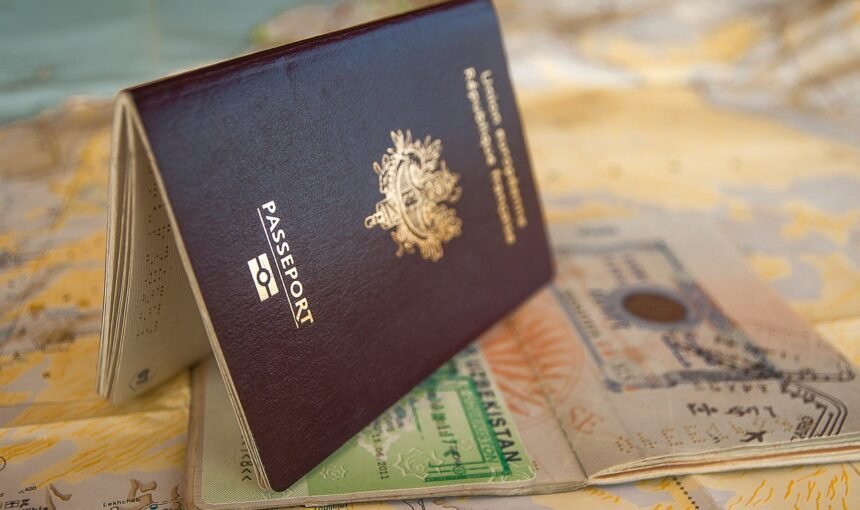We all know that feeling: the excitement of planning a trip abroad, picturing yourself exploring new cities, trying exotic foods, and soaking up different cultures. But before you get carried away with booking flights and hotels, there’s one crucial thing you absolutely can’t forget: visas.
It’s easy to assume that visas are only a concern for people from countries with “weak” passports – you know, the ones that require a stack of paperwork and endless waiting just to get permission to visit anywhere. But the truth is, anyone can run into trouble if they don’t check the visa rules carefully.
You might be surprised to learn how many travelers with powerful passports – the kind that usually allow them to breeze through immigration – end up having their trips disrupted because they didn’t bother to look up the visa requirements. In fact, just last year, thousands of people with strong passports got denied entries to various countries due to not having the visa.. That’s why it’s so important to understand that visa rules apply to everyone, no matter where you’re from or where you’re going.
The "Strong Passport" Paradox
You’ve probably heard people talk about “strong” passports – those magical passports that seem to open doors to almost every country without needing a visa. It’s true, some passports do give you a lot of travel freedom, letting you hop on a plane and simply show up at your destination. But here’s the catch: that freedom can sometimes make you a little too relaxed about the whole visa thing.
Think of it this way: if you’re used to traveling without many restrictions, it’s easy to fall into the trap of thinking it’ll always be that way. You might start to assume that you can just show up anywhere and be welcomed with open arms. But the reality is, visa rules can be tricky, and even the “strongest” passport doesn’t guarantee you a free pass everywhere.
Here’s where things can go wrong:
- Hidden visa needs: You might be allowed to visit a country for tourism, but did you know you might need a different visa if you’re going for work, studies, or even just to pass through on your way to somewhere else? These special visas often have their own sets of rules and requirements.
- Not all trips are created equal: Just because you can visit a country for a vacation doesn’t mean you can go there for any reason. The rules might be different for business trips, volunteer work, or even visiting family.
- Rules can change: Governments can update their visa policies at any time, so what was true last year might not be true today. That “visa-free” access you were counting on? It could suddenly have new conditions or even be gone completely.
It’s like assuming every door in a building will open just because you have a key to the front entrance. Sometimes you’ll run into locked rooms, or you might need a special keycard to get where you need to go.
"Weak" Passports & Heightened Awareness
Now, let’s flip the script and talk about those who travel with “weaker” passports. These are the folks who often face more hurdles and restrictions when trying to travel internationally. It might seem like a disadvantage, but it actually makes them pros when it comes to navigating the world of visas.
Imagine having to apply for a visa almost every time you want to travel. You quickly learn that visa rules are no joke. You become an expert at deciphering complicated applications, gathering the right documents, and figuring out the ever-changing requirements of different countries. It’s a constant learning process, and it makes you incredibly aware of the potential pitfalls.
People with “weaker” passports don’t have the luxury of assuming anything. They know that thorough research is key. They double-check every detail, read the fine print, and make sure they have everything in order well in advance of their trip. They understand that even a small mistake can mean the difference between enjoying their vacation and being turned away at the border.
This experience gives them a unique perspective. They know firsthand how important it is to be prepared and informed, and they often end up being the most knowledgeable travelers when it comes to visas. They’re the ones who can spot potential problems a mile away and offer helpful advice to others who might be less familiar with the process.
Visa Requirements: A Universal Checklist Essential
Here’s the thing: whether your passport is a global VIP pass or requires a bit more legwork, visa requirements should be at the very top of your travel checklist. It doesn’t matter how experienced a traveler you are or how many countries you’ve visited – visa rules can trip up anyone.
Think of it like packing your suitcase: you wouldn’t leave home without making sure you have the right clothes and essentials, right? Well, your visa is like the most important item in your travel bag. Without it, your whole trip could unravel.
So, how do you make sure you’re on the right side of the visa rules? Here’s a quick rundown:
Know what you need: First things first, figure out exactly what kind of visa you need for your trip. Are you going on vacation? Visiting family? Working or studying? Each purpose usually has its own specific visa with different requirements.
Get the paperwork right: Once you know what visa you need, it’s time to gather your documents. This might include your passport, application forms, proof of travel plans, financial statements, and even invitation letters. Make sure you have everything they ask for, and that it’s all up-to-date and valid.
Time it right: Visa processing takes time, so don’t leave it until the last minute. Check how long it usually takes to get your visa approved and factor that into your travel plans. And don’t forget about any fees you might need to pay.
Read the fine print: Pay close attention to any restrictions or special conditions attached to your visa. Some visas might limit how long you can stay, where you can travel within the country, or what activities you can do.
Double-check before you go: Visa rules can change, so it’s always a good idea to check for updates even if you’ve already been approved. A quick look at the official government website or a call to the embassy can save you a lot of hassle later on.
Consequences of Overlooking Visa Requirements
Okay, let’s talk about why getting your visa right is so important. Imagine this: you’ve booked your dream vacation, packed your bags, and you’re all set for an amazing adventure. But when you get to the airport, the airline staff tells you that you can’t board the plane because you don’t have the right visa. Talk about a nightmare start to your trip!
That’s just one of the things that can happen if you overlook visa requirements. Here are a few more potential consequences:
- Stopped at the border: You might make it to your destination, but get stopped at immigration because your visa isn’t valid or doesn’t cover the purpose of your visit. This could mean being sent straight back home without even setting foot in the country.
- Detention and deportation: In some cases, you could even be detained by authorities and eventually deported, which is a stressful and expensive experience.
- Travel plans ruined: Even if you don’t face deportation, visa issues can cause major disruptions to your trip. You might miss flights, lose out on prepaid tours or accommodations, and waste precious time and money trying to sort things out.
- Financial headaches: Dealing with visa problems can lead to unexpected costs, like paying fines, rebooking flights, or even hiring legal help.
No one wants their trip to turn into a stressful ordeal. That’s why taking the time to understand and meet visa requirements is absolutely crucial. It’s a small effort that can save you a lot of trouble and ensure your travel experience is smooth and enjoyable.
Tips for Avoiding Visa-Related Issues
Alright, let’s wrap things up with some practical tips to keep you out of visa trouble:
- Use online tools: There are some handy online visa checkers that can give you a quick overview of the requirements for your destination. Just remember to always double-check the information on the official government website of the country you’re visiting to be absolutely sure.
- Talk to the experts: If you’re unsure about anything, don’t hesitate to reach out to the embassy or consulate of the country you’re planning to visit. They can provide the most up-to-date and accurate information, and answer any specific questions you might have.
- Get some help: If you’re feeling overwhelmed by the visa process, or if you have a complicated situation, consider hiring a visa agent. They can guide you through the process, help you gather the necessary documents, and even submit your application on your behalf.
- Keep copies: Always make copies of all your visa-related documents, including your application, passport, and any supporting materials. Keep one set with you while you travel, and leave another set with someone you trust back home, just in case.
- Don’t wait until the last minute: Visa processing can take time, so start the process well in advance of your trip. Give yourself plenty of time to gather documents, fill out applications, and deal with any unexpected delays.
No matter where you’re from or where you’re going, remember that checking visa requirements is a non-negotiable part of planning any trip abroad. It’s like buying travel insurance – you hope you won’t need it, but you’ll be incredibly grateful you have it if things go wrong.
Don’t let a little piece of paper ruin your travel dreams! Be a savvy traveler, do your research, and make sure you have everything in order before you head to the airport. A little preparation can go a long way in ensuring your trip is smooth sailing from start to finish.
Now that you’re in the know, spread the word! Share this article with your friends, family, and fellow travel enthusiasts. Let’s make sure everyone understands the importance of checking visa requirements and travels with confidence.
Adrenaline junkie with a passion for exploring off-the-beaten-path destinations and finding unique ways to stay active. Expect stunning scenery, challenging workouts, awesome travel tips and a whole lot of fun. Let’s get sweaty and explore the world together!




